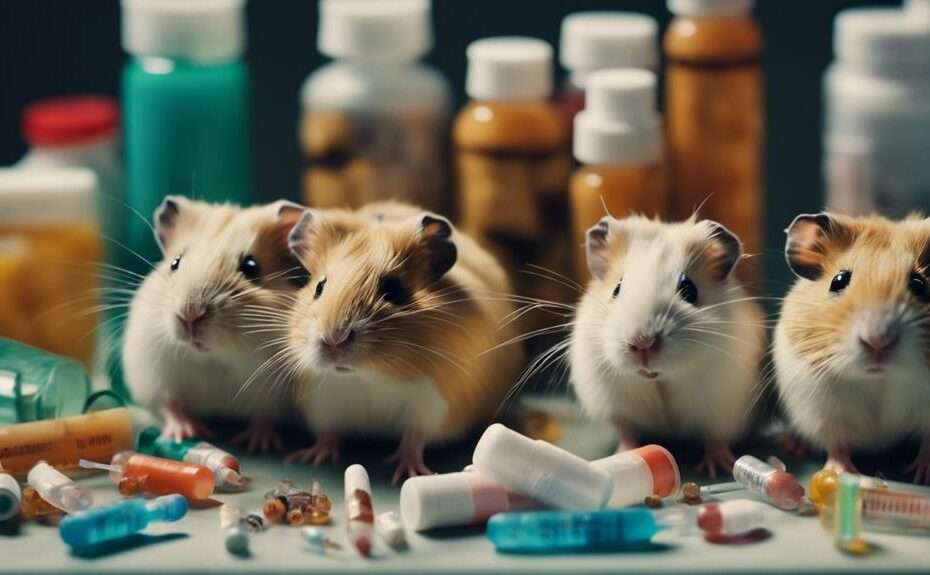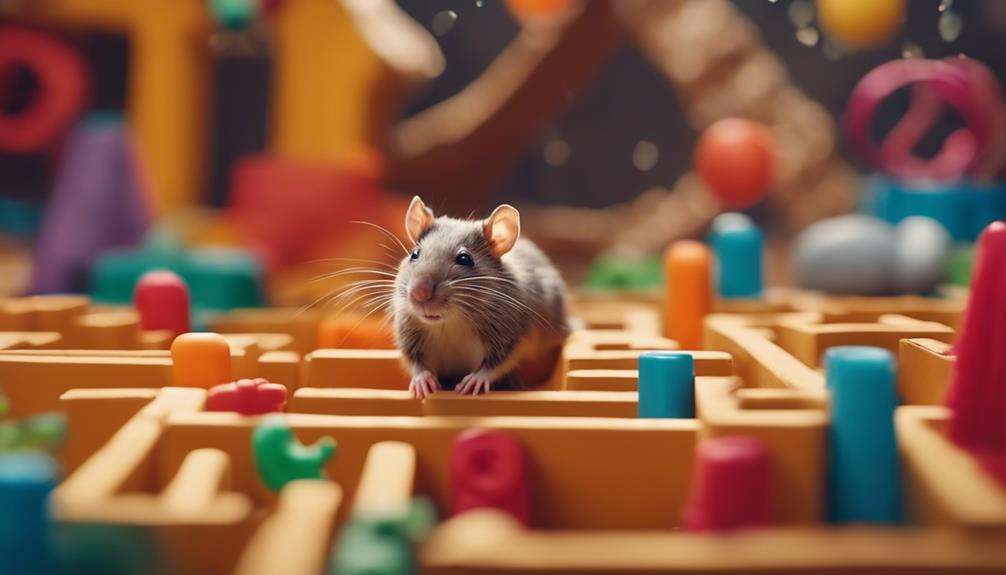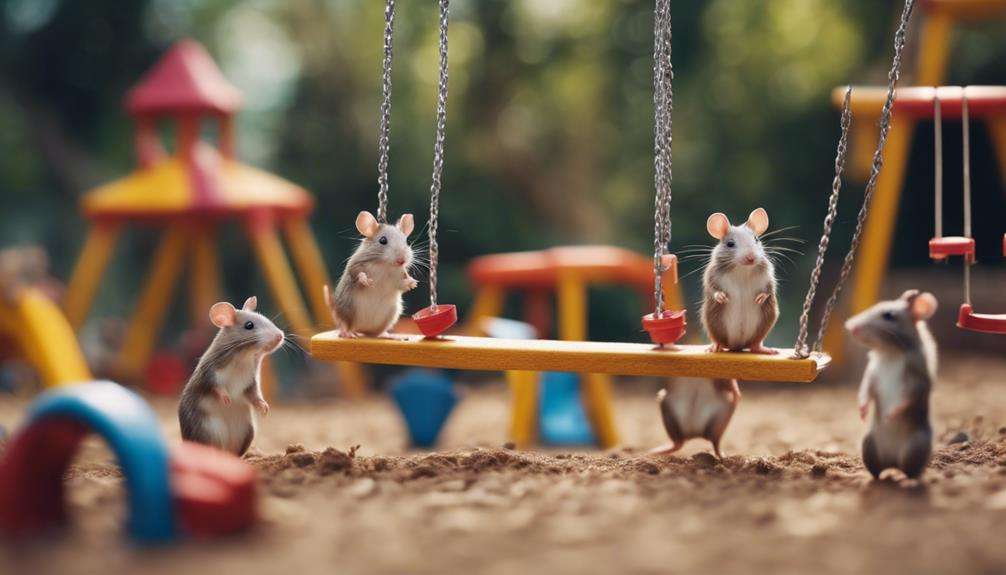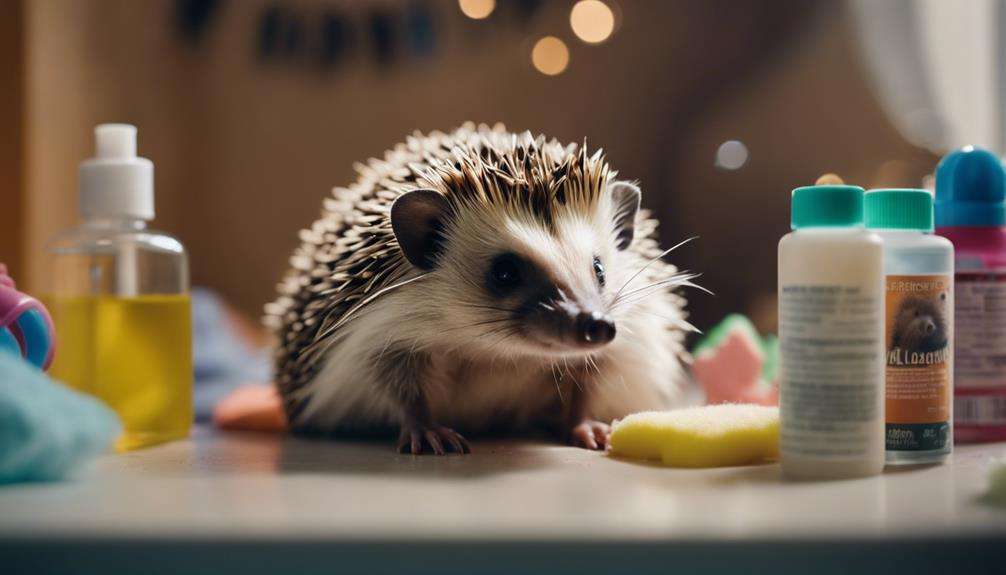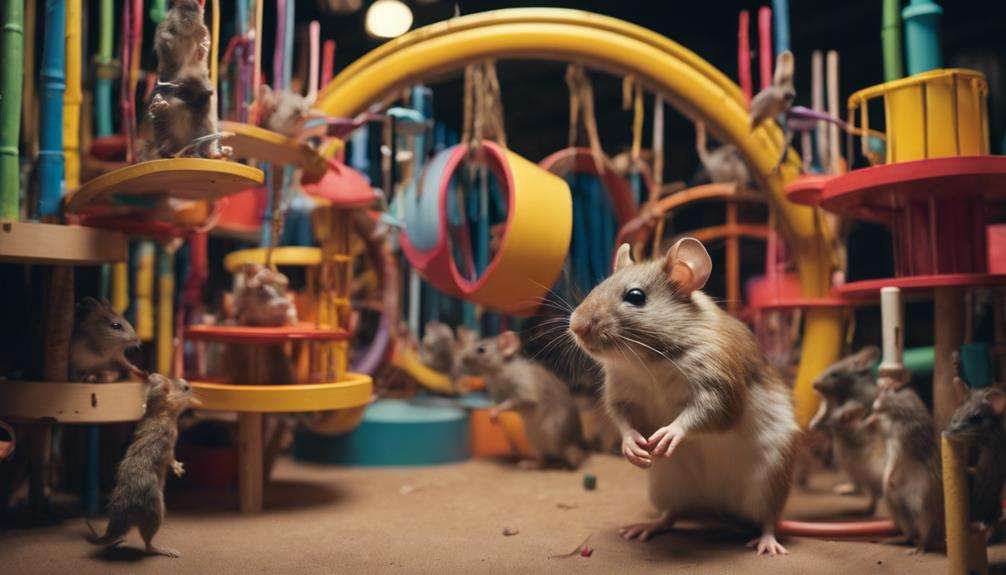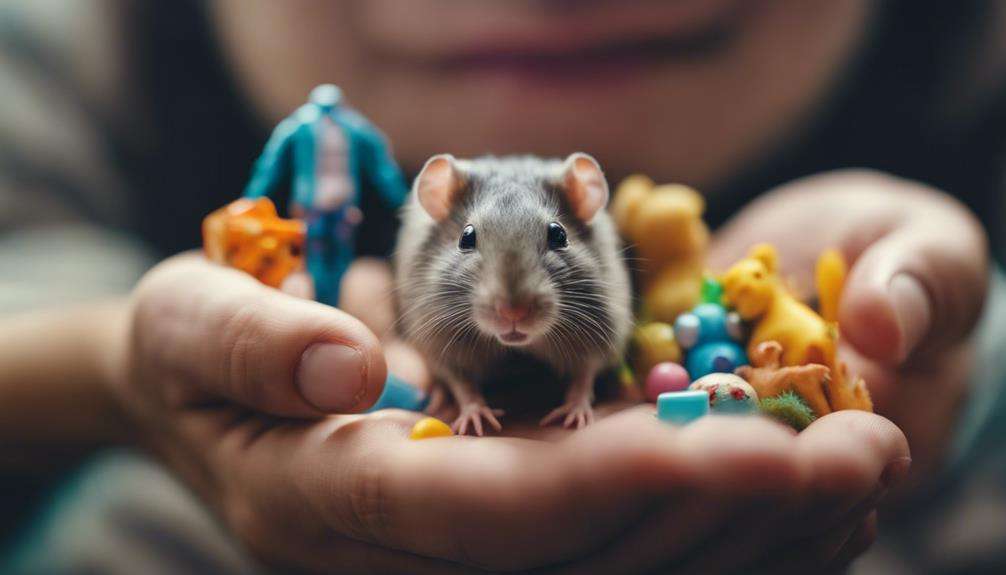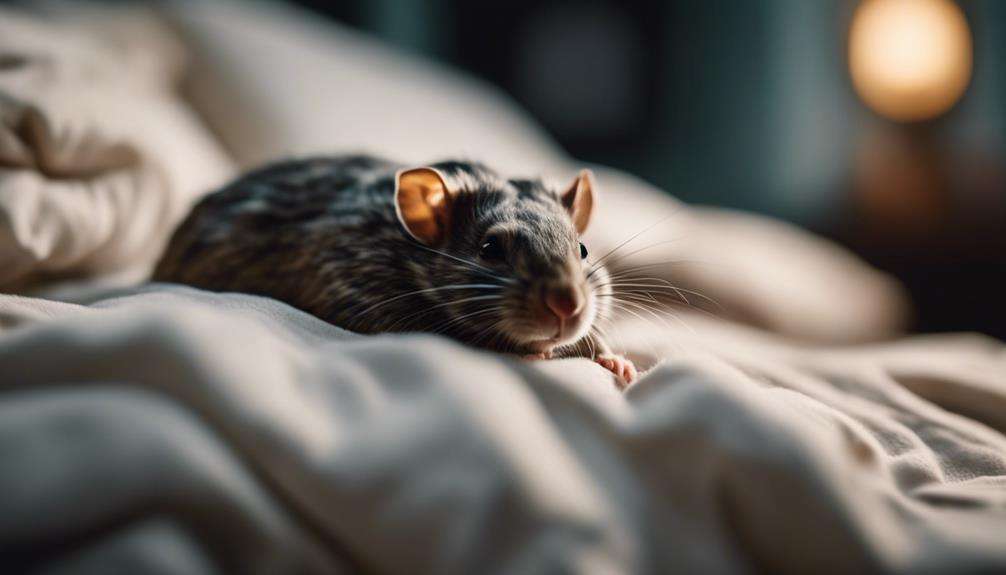You know quirky rodents are fascinating creatures, but have you ever wondered why they are prone to health issues?
From their unique dietary needs to the impact of environmental stressors, there are various factors at play. Genetic predispositions and specialized adaptations also contribute to their vulnerability.
As you explore the intricacies of their health challenges, you might uncover surprising insights that shed light on the complexities of caring for these quirky rodents.
Key Takeaways
- Inadequate vitamin C intake leads to health issues like swollen joints in guinea pigs.
- Improper housing and pollution impact rodents' respiratory and skin health.
- Genetic predispositions and inbreeding can increase the risk of inherited diseases.
- Behavioral traits, like aggression, influence quirky rodents' susceptibility to health problems.
Unique Dietary Needs of Quirky Rodents
Quirky rodents, such as guinea pigs, possess a unique dietary requirement for vitamin C due to their inability to synthesize this essential nutrient. Inadequate vitamin C intake can lead to scurvy in guinea pigs, manifesting as symptoms like swollen joints and a rough hair coat.
To prevent such health issues, it's crucial to supplement their diet with fresh fruits and vegetables rich in vitamin C. Guinea pigs need a daily intake of approximately 10-30 mg/kg of vitamin C to maintain optimal health. Without this vital nutrient, guinea pigs are at risk of developing severe health complications.
Providing a balanced diet that meets their specific dietary needs is essential for ensuring the well-being of these quirky rodents. By understanding and addressing their unique dietary requirements, you can help prevent potential health issues and ensure a happy and healthy life for your guinea pig.
Environmental Stressors Impacting Rodent Health
Improper housing and habitat destruction can expose quirky rodents to pollutants that compromise their health.
Understanding the effects of pollution and habitat disruption on rodent populations is crucial for mitigating environmental stressors.
Addressing these factors is essential in maintaining the well-being of quirky rodents in captivity.
Role of Pollution
The impact of pollution on rodent health manifests through various respiratory, dermatological, and systemic health issues. Environmental stressors like pollution can lead to respiratory problems in quirky rodents, affecting their breathing and overall lung function. Skin irritations are also common due to exposure to toxins and pollutants in their habitats.
Furthermore, pollution can weaken the immune system of these rodents, making them more susceptible to infections and diseases. The presence of chemical pollutants in the environment can result in neurological issues and organ damage in quirky rodents, impacting their overall well-being. Additionally, pesticides and heavy metals in the environment can disrupt the reproductive health of these animals.
The accumulation of pollutants in food sources further exacerbates systemic health issues in quirky rodents.
Habitat Destruction's Effects
Habitat destruction significantly impacts rodent health by disrupting essential resources and exposing them to increased risks from predators and harsh environmental conditions. When their habitats are destroyed, quirky rodents lose crucial nesting sites and food sources, forcing them to search for alternatives in unfamiliar and often dangerous environments. The increased exposure to predators and adverse weather conditions can lead to heightened stress levels and decreased overall health.
Moreover, the disruption of natural ecosystems due to habitat destruction can have far-reaching consequences, affecting the intricate balance of food chains and biodiversity essential for rodent populations. Fragmentation of habitats can isolate rodent groups, leading to genetic issues and reduced resilience. Additionally, pollution from human activities in destroyed habitats can directly harm rodent health, impacting their survival and well-being.
Breeding Challenges and Health Risks
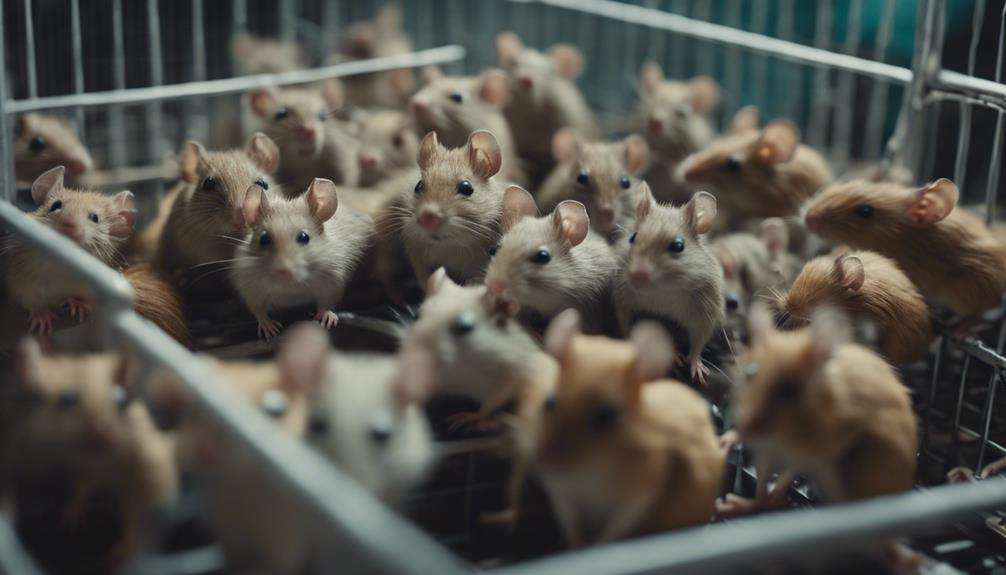
When breeding quirky rodents, it's crucial to be aware of the potential genetic health predispositions that may arise, leading to disorders and weakened immunity.
Selective breeding for specific traits should be carefully monitored to avoid health issues such as respiratory problems and reproductive complications.
Consideration of environmental stress factors is essential to prevent overlooking crucial health aspects and increasing susceptibility to diseases.
Genetic Health Predispositions
Selective breeding practices in quirky rodents can result in genetic health predispositions that increase the risk of inherited diseases and conditions. When focusing on breeding practices, genetic diversity is often compromised as breeders selectively breed for specific traits. This reduction in genetic diversity can heighten the likelihood of quirky rodents inheriting health issues.
Additionally, inbreeding within quirky rodent populations can exacerbate these genetic predispositions, impacting their overall well-being. Breeding challenges faced by breeders can lead to quirky rodents being more susceptible to congenital abnormalities or developmental problems.
To address these concerns, responsible breeding practices and genetic screening play crucial roles in managing health risks associated with genetic predispositions in quirky rodents.
Breeding Selection Impacts
Breeding quirky rodents for specific traits can inadvertently increase their susceptibility to genetic health issues, posing challenges that impact their overall well-being. Selective breeding practices aimed at enhancing certain physical or behavioral characteristics can lead to a higher incidence of health problems in these rodents.
Respiratory problems and dental issues are among the genetic health issues that may arise more frequently due to selective breeding. These issues can compromise the well-being of quirky rodents, affecting their quality of life.
To address these breeding challenges and health risks, it's crucial to prioritize careful breeding selection and provide regular veterinary care to monitor and manage any emerging health issues. By being attentive to these factors, the overall health and vitality of quirky rodents can be better preserved.
Environmental Stress Factors
Environmental stress factors contribute significantly to the breeding challenges and health risks faced by quirky rodents. Inadequate cage space can lead to overcrowding, stress, and aggression among mice and rats. Improper diet, such as incorrect nutrition, can result in various health issues, affecting breeding success and overall well-being. Lack of socialization, including insufficient interaction with conspecifics and humans, can lead to behavioral problems and impact breeding behaviors. Additionally, poor environmental enrichment, such as inadequate mental stimulation and enrichment opportunities, can contribute to health issues and genetic disorders in quirky rodents.
Behavioral Traits Influencing Health Concerns
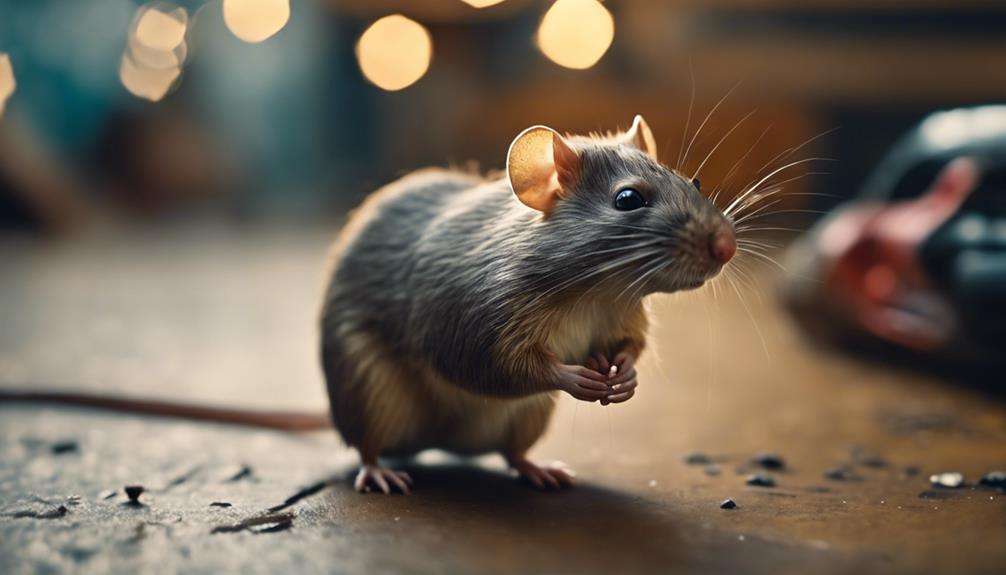
Rodents' susceptibility to health issues is significantly influenced by their behavioral traits, particularly territorial aggression and male dominance behaviors. These behaviors can lead to stress-related barbering, where rodents excessively groom themselves or cage mates, causing hair loss and potential skin issues.
Additionally, quirky rodents may develop foot necrosis due to nesting material wrapping around their toes, leading to severe health concerns if not addressed promptly. Providing enrichment toys for these rodents can help alleviate aggression and promote mental stimulation, ultimately improving their overall health outcomes.
Common Infectious Diseases in Quirky Rodents
In the realm of quirky rodents, susceptibility to infectious diseases presents a significant health concern that requires careful attention and proactive measures. Here are some common infectious diseases that affect quirky rodents:
- Respiratory Infections: Rodents like guinea pigs and hamsters are prone to respiratory infections, such as mycoplasmosis, which can lead to symptoms like sneezing, nasal discharge, and difficulty breathing.
- Bacterial Skin Infections: These rodents are also susceptible to bacterial skin infections, causing dermatitis and hair loss. Maintaining good hygiene and clean living environments is crucial to prevent such infections.
- Salmonellosis: This serious disease can be transmitted to humans through contact with rodent droppings. It's essential to handle rodents carefully and wash hands thoroughly to prevent the spread of salmonella bacteria.
- Lassa Fever and Hantaviruses: These diseases, transmitted through rodent excreta, can have severe consequences for human health. Proper handling practices and avoiding exposure to rodent waste are key preventive measures against contracting Lassa fever and Hantaviruses.
Handling and Hygiene Practices for Health
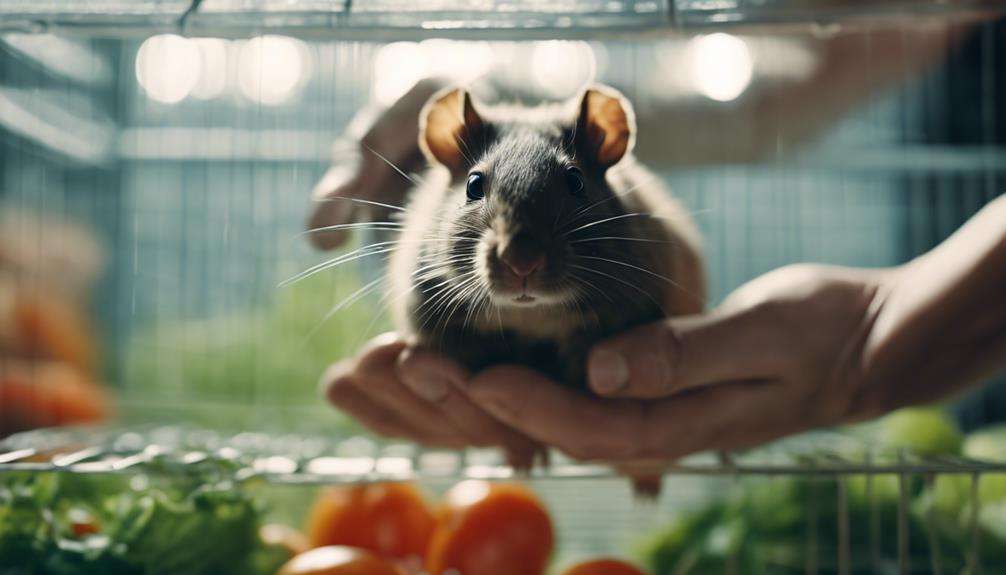
Implementing proper handling and hygiene practices is crucial for maintaining the health and well-being of quirky rodents like pet guinea pigs. When handling these animals, it's important to be gentle and calm to reduce stress and prevent injuries. Additionally, ensuring that the temperature in their environment is suitable for them can also contribute to their overall health.
Regular hygiene practices, such as cleaning their cages frequently and providing fresh bedding, play a significant role in preventing health problems in pet rodents. By maintaining a clean living space, the risk of infections and respiratory ailments can be minimized.
Supervised handling sessions not only help in building a bond with your quirky rodent but also allow for the early detection of any health changes or issues. Educating yourself on proper hygiene and handling practices is essential for ensuring the well-being of your pet rodent. Remember, a clean environment and gentle handling are key factors in promoting the health and happiness of your quirky rodent friend.
Veterinary Care and Treatment Options
For optimal health outcomes in your pet rodents, prioritizing veterinary care and exploring treatment options tailored to their unique biology is essential. When it comes to veterinary care for these quirky animals, specialized knowledge is crucial due to their distinct biology and health requirements. Diagnostic tools such as binocular loupes and otoscopes play a vital role in conducting thorough examinations to identify any underlying health issues promptly.
Here are four key aspects to consider for veterinary care and treatment options for your pet rodents:
- Regular Health Check-ups: Schedule routine visits to a veterinarian experienced in rodent care to monitor your pet's well-being and address any concerns promptly.
- Diagnostic Tests: In cases of suspected illness, diagnostic tests like blood work and imaging may be necessary to accurately diagnose conditions such as respiratory infections.
- Treatment Plans: Work closely with your veterinarian to develop tailored treatment plans that consider the unique biology of your pet rodents.
- Monitoring Signs of Illness: Stay vigilant for signs of illness such as changes in behavior, appetite, or activity levels, and seek veterinary care promptly if any abnormalities arise.
Frequently Asked Questions
Why Do Rodents Carry so Many Diseases?
You might wonder why rodents carry so many diseases. It's a mix of factors: poor rodent hygiene, efficient disease transmission, compromised immune systems, environmental influences, and genetic predisposition, making them prime hosts for pathogens.
Why Do Pet Rats Have so Many Health Problems?
You have to understand that pet rats, due to genetic predisposition, environmental factors, nutritional deficiencies, stress levels, and breeding practices, are more prone to health issues. Regular veterinary care and a balanced diet are crucial.
Why Are Rodents a Health Hazard?
When rodents infest an area, public health is at risk due to disease transmission. Rodent control and effective pest management are crucial to minimize these hazards. Take precautions, clean up droppings, and prevent infestations.
How Can Rodents Negatively Affect Human Health?
Rodent infestations bring allergies, respiratory issues, and parasitic infections. Contamination risks from their droppings spread diseases like salmonellosis and hantaviruses, affecting over 90 million people annually. Proper cleanup and prevention are crucial.
Conclusion
In conclusion, quirky rodents are prone to health issues due to their unique dietary needs, environmental stressors, breeding challenges, behavioral traits, and susceptibility to infectious diseases. Proper care, regular veterinary check-ups, and good hygiene practices are crucial in ensuring their well-being.
Remember, just like any other creature, these fascinating rodents have their vulnerabilities, but with the right attention and care, they can thrive like a well-oiled machine in their underground world.
